Arthropod Sensory Biology & Neuroethology
Our lab investigates the sensory neuronal basis for behaviors in arthropods, especially mosquitoes and other insects that transmit pathogens to humans, animals, and plants. Click the link below to learn more about our projects.
research summary

Arthropod-borne diseases continue to plague developing regions and are being recognized as rising threats to public health in developed nations. Anthropogenic factors such as trade, international travel, global climate change, and habitat modification are major contributors to the spread of vectors and disease-causing agents. Moreover, pesticide/drug resistance and unsustainable control programs in many locations have eroded current methods of vector control and disease treatment. New insights into the biology of disease-transmitting insect and tick species are acutely needed in order to combat their devastating effects on human health and economic prosperity.
Our lab investigates the sensory neuronal basis for behaviors in disease-transmitting arthropods, especially mosquito vectors of arboviruses like Dengue and Zika. Of particular interest are the pathways that contribute to chemical- and temperature-oriented behaviors such as host seeking, nectar feeding and oviposition site selection. One of our major goals is to understand complex biological systems by employing a range of techniques including gene expression, neurophysiology, and animal responses to sensory stimuli. A long-term objective of our efforts will be to contribute to reductions in human and animal disease transmission at local, national, and regional levels by developing novel methods of arthropod surveillance and control that can be integrated into existing pest management programs.
research summary

Arthropod-borne diseases continue to plague developing regions and are being recognized as rising threats to public health in developed nations. Anthropogenic factors such as trade, international travel, global climate change, and habitat modification are major contributors to the spread of vectors and disease-causing agents. Moreover, pesticide/drug resistance and unsustainable control programs in many locations have eroded current methods of vector control and disease treatment. New insights into the biology of disease-transmitting insect and tick species are acutely needed in order to combat their devastating effects on human health and economic prosperity.
Our lab investigates the sensory neuronal basis for behaviors in disease-transmitting arthropods, especially mosquito vectors of arboviruses like Dengue and Zika. Of particular interest are the pathways that contribute to chemical- and temperature-oriented behaviors such as host seeking, nectar feeding and oviposition site selection. One of our major goals is to understand complex biological systems by employing a range of techniques including gene expression, neurophysiology, and animal responses to sensory stimuli. A long-term objective of our efforts will be to contribute to reductions in human and animal disease transmission at local, national, and regional levels by developing novel methods of arthropod surveillance and control that can be integrated into existing pest management programs.
Meet our team
Click below to learn more about the people behind the research in our lab.





